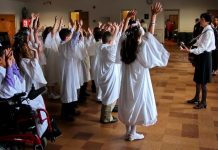
SUSAN K. ROWLAND
“Enlarge the site of your tent,
and let the curtains of your habitations be stretched out;
do not hold back; lengthen your cords
and strengthen your stakes.”
—Isaiah 54:2, NRSV
We catechists are busy people, generous with our time. Still, we want to expand our spiritual horizons, as Isaiah counsels in this Scripture passage. We can always learn more about God and the faith in God that we profess and share with our students. As Jesus’ followers, we must keep growing in our own faith in order to become better disciples and thus better catechists.
Here are some suggestions for faith formation that you may want to explore. These suggestions include opportunities for personal exploration as well as group experiences. Both are necessary if we are to become well-formed in our faith.
Personal Study
Faith formation begins with your personal prayer time. Be sure to spend time with God every day. Learn to listen, which is the most important form of prayer. Ultimately, the best faith formation is a one-on-one encounter with the Author of our faith.
Set aside a block of time every few days for spiritual reading, including Scripture. Start with the Lectionary readings for the week. Get ideas for good books to read from your DRE, parish librarian, and the book-review section in your diocesan newspaper.
Read the teaching manual for your program curriculum for the grades just before and after the grade, you teach. This will give you a better idea about what your students covered last year and what they will be discussing next year. If you come across unfamiliar topics, make the effort to study about them.
If your diocese has a religious education library, pay a visit and plan to spend an hour or two familiarizing yourself with what is available. In addition to books, you will find teaching CDs and DVDs. You can listen to a CD during your commute or while taxiing your children to their activities. You can watch a DVD for an hour in the evening instead of your usual television viewing. The librarian will be able to recommend good materials on the topics you teach or want to explore for your own enrichment. There are many possibilities: Church history, Sacraments, Scripture, social justice, etc.
Visit Christian bookstores, Catholic and Protestant, and look at the materials available for children in your class’s age group. You may find some wonderful material for your class. You certainly will get new ideas.
Finally, take a personal sabbath day once a month. Make it a day when everyone in the house will be gone. Or get a sitter and go to a library or cafe. Don’t do any work, and don’t try to catch up on duties and obligations. Just enjoy the day with your Bible, some other spiritual reading, and the materials you gathered from your forays to libraries or bookstores. You’ll be amazed at the learning you can do and the creative ideas you can generate in one uninterrupted day. You will be refreshed and want to continue this practice.
Learn about the Youth Cultures
One sure way to expand your horizons is to explore the books, music, and videos that your learners enjoy. Read some of the books that are popular; listen to the music; watch the favorite TV programs; go to a movie your students are raving about.
Whether it’s the Ice Age movies, Harry Potter, or even Stephenie Meyer’s vampire romances, consider this research into your students’ interests and culture. You may not like what you read or even consider it good for your students’ spiritual development. But if you are not familiar with what young people today are doing, how can you talk about the messages they are getting from these sources? Nothing makes a group of students sit up and pay attention more than a teacher who has some knowledge of their favorite books, music, TV shows, and movies.
We catechists not only present our faith to our learners. We also must challenge the culture they live in and accept as normal. Much of what our young people watch and listen to is not healthy. We must be ready with knowledge and answers to challenge what is wrong in our culture.
Students’ Music
To learn more about your students’ culture, start with Anna Scally’s Cornerstone Media, Inc. at cornerstonemedia.org. This website and the products Scally produces make suggestions for prayer experiences and lessons using the music your students listen to right now. There are discussions about the values, good and bad, presented in current pop songs. The website includes a list of current hits great for dance or other youth events; classroom ideas; and links to music charts, song lyrics, etc.
Parish Opportunities
Parishes often hold continuing certification classes for their catechists, or catechists go to diocesan events as a group. In addition, consider the following great opportunities for faith formation: Lenten and Advent missions; Bible study or fellowship groups; parenting classes; guest speakers; musical concerts. Plan to attend as many of these occasions as you can. If your parish is small and offers few activities, check other parishes, especially the large ones, for chances to expand your horizons.
If your parish (or diocese) does not offer special retreats or days of reflection, check out nearby retreat centers and see what they offer for a few days of guided personal time with a spiritual director. If possible, go on your own retreat so that you have a concrete experience to report. Then propose to your parish or diocesan catechetical leadership that a similar opportunity be made available to catechists in your program. Emphasize that this type of formation will not only make the program better; it will help lower the turnover rate.
Your Diocesan Newspaper
The official newspaper of your diocese is a treasure trove for catechists seeking faith formation opportunities. Read all of it, cover to cover. You will find feature stories, reports of recent speakers, columns, and announcements about events going on in parishes throughout the diocese.
Attend whatever sounds intriguing to you. You never know when you will experience something you can translate into a lesson for your students.
Recent issues of my diocesan newspaper included articles or announcements about a White Mass for doctors, nurses, and paramedics, with the homily touching on end-of-life decisions and medical ethics; a guest speaker who had been involved in the New Age movement for 27 years and has come back to the Catholic Church; a new marriage preparation program being implemented in our diocese; and a huge Marian festival to honor Our Lady of Guadalupe.
I attended the New Age talk and a parish presentation on the new marriage program, even though I have never been involved in New Age and I’m not married or engaged. Both talks were inspiring, educational, and eye-opening. I definitely expanded my horizons. We catechists can use anything we learn—and we never know when or where that new knowledge will be used in the Good News we pass on to our students.
The Internet
The internet is a wonderful source of information about events for catechists, Bible studies, Church policies, and reviews of books and movies. The following are some great places to begin, and some of the best features of each site:
* usccb.org: This is the website of the United States Conference of Catholic Bishops. Here you will find the full text of the New American Bible. Simply click on the book of the Bible you are studying and click on the chapter.
* catholicnews.com: This is the website of Catholic News Service. This site offers up-to-the-minute news, plus book and movie reviews.
* catholic.org: Catholic Online offers daily Bible readings under “Newsletters” plus great articles, columns, and reviews of books and movies.
These and many other sites offer Catholic links to explore, including the Vatican’s website.
Diocesan and National Gatherings
Large gatherings for youth and religious educators are intense, day-long or multi-day experiences of shared prayer, workshops, and fellowship with other “laborers in the vineyard.” Attending at least one of these each year should be a must on every catechist’s calendar. You will make new friends, find tons of free and inexpensive stuff to bring home, and be inspired to “expand your horizons” in new and unexpected ways.
* Los Angeles Religious Education Congress (LAREC, recongress.org) is held every year in February or March in Anaheim, CA. The Congress includes over 550 individual workshops, keynote addresses, Masses, concerts, art exhibits, and an exhibitors hall with over 200 exhibitors. Tens of thousands of catechists from every state and dozens of countries attend this event every year. After attending LAREC, you should have enough materials, ideas, and inspiration to keep you going for a full year—until the next Congress.
* The National Catholic Educational Association’s (NCEA, ncea.org) Convention & Exposition. This event is for all Catholic educators and is held annually the week after Easter at different sites around the country. Anyone working in or interested in Catholic education is welcome. Approximately 400 workshops and numerous exhibits are part of this event.
* National Conference on Catholic Youth Ministry (NCCYM, nccym.nfcym.org) is the largest adult conference for Catholic youth ministers in the U.S. It holds its convention every other year on even-numbered years. Join your fellow youth ministers and religious educators for four days of keynote addresses, workshops, shared prayer, networking, exhibits, and entertainment.
* Your diocese or regional archdiocese may hold a one-day annual conference especially for catechists. Check your diocesan website or ask your DRE and fellow catechists what is available. Although on a much smaller scale than national events, a diocesan religious education gathering will include opening prayer, a keynote speaker, workshops, and exhibits, including religious education textbook publishers.
College Classes and Continuing Education Units
Many Catholic colleges and universities offer continuing education units (CEU) for attending workshops and keynote addresses at gatherings such as the Los Angeles Religious Education Congress. They also offer degree or certificate programs. If you are interested in getting credit for the events you attend, check out these opportunities.
Your diocese likely offers some sort of continuing education opportunity through a Catholic college or university. Sometimes classes are held at the college campus or at a diocesan meeting site. One example is the nationwide Loyola Institute for Ministry Extension (LIMEX) program, which offers theology degrees in which a small cohort of students meet regularly and advance together through the courses required.
If you are interested in more intense study in a formal program, find out what programs other catechists in your area are attending. Your pastor, principal, and/or DRE will have the information you need or can direct you further.
Regardless of what avenue of learning and formation you pursue, be sure to select a course of study that suits your interests and will deepen your commitment to catechesis and to your faith. Be sure it fits your time constraints and budget limitations. It is likely that you will be able to meet diocesan certification requirements at the same time you are in this course of study, since it will go above and beyond the usual requirements for catechists.
Filling Our Wells
Our own faith formation is not about finding stuff to do in our classrooms or doing things to fill requirements. These things, excellent as they may be, are not the essence of catechesis.
Faith formation is about us. It’s about filling our wells so that we have that wonderful “living water” Jesus spoke of in the fourth chapter of the Gospel of John. That is what we want for ourselves and that is what we want to offer our students: a better and more mature relationship with Jesus.
The National Directory for Catechesis is clear about the ongoing faith formation of catechists: “Since effective catechesis depends on virtuous and skilled catechists, their ongoing formation should enhance the human, spiritual, and apostolic qualities and catechetical skills they bring to their ministry” (55E). Our parishes and dioceses offer support and opportunities; our responsibility is to rely on this support and claim these opportunities.
Susan K. Rowland, a catechist for over 20 years, is the author of Make Room for God: Clearing Out the Clutter (St. Anthony Messenger Press). She is a freelance writer and a nationally known speaker.
This article was originally published in Catechist magazine, February 2010.
Image Credit: Javier Sierra on Unsplash




